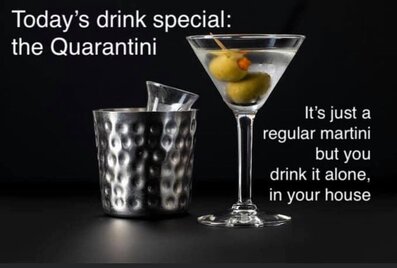|
We’ve all struggled in our own ways to adjust to the unfolding global crisis. Though the severity of the impact varies widely, humanity is generally contending with not only the tangible disruptions in every domain of our lives, but also the loneliness and isolation in being cut off from nourishing social contact and our various communities. We may be in intense grief after losing a loved one; we may be overworked or furloughed, bored or overwhelmed, checked out or completely frazzled, anxious or depressed. We are trying our best to cope, and coping can look a lot of different ways.
Quarantine has additionally disrupted access to treatment. AA meetings have been moved online, (which has its pros and cons); this impacts those in sober living environments who are required to attend weekly meetings to maintain their housing but might not have reliable internet access. There is an outsized impact on people being treated for opioid use with medication-assisted treatments (especially those on daily dosing on-site protocols), due to disruptions in access to services, which may result in an uptick in relapses, and consequently, fatal overdoses. (For more on that topic, see Harm Reduction Coalition’s suggestions for safer drug use to minimize transmission risk of COVID-19--such as not sharing supplies and other hygiene practices--as well as the City of San Francisco’s suggestions for medical providers who work with substance users, encouraging sufficient take-home prescriptions for opioid replacement therapies.) Though I agree with harm reduction-oriented neuroscientist Carl Hart that we don’t need to panic about a huge surge in addiction following quarantine, I still feel called to discuss how we might minimize the harms of our current situation. Most of us are wrestling with the deleterious effects of losing the structure of our daily routines. Some have shared that as the line between "work" and "not-work" blurs, they’ve found that their alcohol or substance use has crept slowly into earlier hours of the day; those who are out of work may feel at a loss with what to do with their time. Additionally, just as our levels of psychic stress escalate, our other methods of emotional regulation may be unavailable, and often we are left with the paradoxical reliability of substance use as a handy coping tool. Given all of this--our grief, fear, rage, and deep uncertainty about the future--the changes we see in our habits are totally understandable. (As the above linked articles and stats illustrate: you are not alone.) My efforts to bring this into conversation are meant never to shame, or to nag with unwanted advice, but to illuminate some potentially viable paths forward. This may not be a time to take on drastic self-improvement projects, but perhaps to work towards more holistic, compassionate self-care. If you are interested in making some shifts in how you're using alcohol or other substances, or just wanting to use in a more mindful manner, I hope some of these tactics might be helpful for you. I've written a blog series about the harm reduction approach to substance use, and today I’ll use my Menu of Change Options post to walk through some potential ways to manage one's habits and patterns: You can reduce the AMOUNT you use each time
You can alter the FREQUENCY of your use
You can change the number or types of substances you MIX together
You can change HOW you take your substance (route of administration)
You can change the SITUATION that you use in (setting--perhaps the most challenging variable right now)
You can put more effort into PLANNING your use
You can try SUBSTITUTING a less harmful drug for a more harmful one:
You can focus on OVERDOSE PREVENTION
If you decide that you are going to keep using just as you are now, you can still engage in SELF-CARE while using
You can attend to other MENTAL HEALTH and wellness variables (again, without changing your use at all), with an emphasis on decreasing isolation
Finally, though I might caution against big drastic changes right now, some are inspired to move towards ABSTINENCE, via different methods
Again, for a deeper dive into these strategies, you can check out my Menu of Change Options post, review my whole blog series on harm reduction, or pick up the excellent book Over the Influence: The Harm Reduction Guide for Managing Drugs and Alcohol for more detailed self-help strategies. You may also desire professional assistance in designing an individualized harm reduction plan to meet your specific needs. The compassionate, skilled practitioners at Healing Realms offer harm reduction therapy, as well as multiple other modalities to assist in treating any underlying mental health conditions being exacerbated by current stressors. Please don't hesitate to reach out to us if you have any questions, and, as always, I am available as a resource if you need assistance with appropriate referrals for care. Take good care of yourselves, everyone!
1 Comment
|
Jessica Katzman, Psy.D.I'm a psychologist with a private practice in San Francisco's Castro District. I'm interested in harm reduction, LGBTQQIAAP issues, psychedelic integration, social justice conversations, size acceptance, and any intersections of the above. I welcome your comments! Categories
All
Archives
June 2020
Disclaimer: The information and resources contained on this website are for informational purposes only and are not intended to assess, diagnose, or treat any medical and/or mental health disease or condition. The use of this website does not imply nor establish any type of therapist-client relationship. Furthermore, the information obtained from this site should not be considered a substitute for a thorough medical and/or mental health evaluation by an appropriately credentialed and licensed professional. This website includes links to other websites for informational and reference purposes only. This website does not endorse, warrant or guarantee the products, services or information described or offered at these other websites. Examine the content carefully.
|


 RSS Feed
RSS Feed